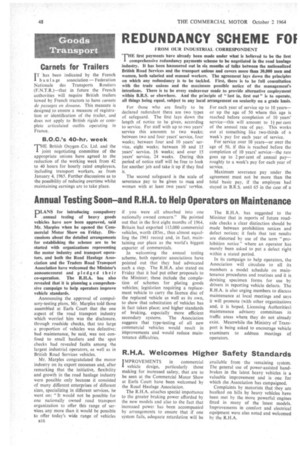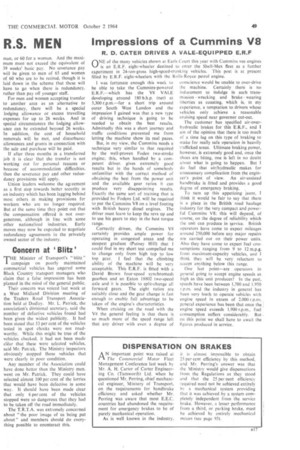REDUNDANCY SCHEME FOF R.S. MEN
Page 50

Page 51

If you've noticed an error in this article please click here to report it so we can fix it.
FROM OUR INDUSTRIAL CORRESPONDENT THE first payments have already been made under what is believed to be the first I comprehensive redundancy payments scheme to be negotiated in the road haulage industry. It has been hammered out in six months of talks between the nationalized British Road Services and the transport unions and covers more than 30,000 men and women, both salaried and manual workers. The agreement lays down the principles on which any redundancy is to be tackled. First, there is to be full consultation with the trade unions and the maximum possible notice of the management's intentions. There is to be every endeavour made to provide alternative employment within B.R.S. or elsewhere. And the principle of "last in, first out" is to operate, all things being equal, subject to any local arrangement on seniority on a grade basis.
For those who are finally to be declared redundant there are two types of safeguard. The first lays down the length of notice to be given, according to service. For staff with up to two years' service this amounts to two weeks; between two and four years' service, four weeks; between four and 10 years' service, eight weeks; between 10 and 15 years' service, 16 weeks; and over 15 years' service, 24 weeks. During this period of notice staff will be free to look for another job and take it up if they find it.
The second safeguard is the scale of severance pay to be given to men and women with at least two years' service. For each year of service up to 10 years— or up the age of 50 where this age is reached before completion of 10 years' service—this will amount to If per cent of the annual rate of pay. This works out at something like two-thirds of a week's pay for each year of service.
For service over 10 years—or over the age of 50, if this is reached before the completion of 10 years' service—the rate goes up to 2 per cent of annual pay— roughly to a week's pay for each year of service. , Maximum severance pay under the agreement must not be more than the total basic pay, if the employee had stayed in B.R.S. until 65 in the case of a man, or 60 for a woman. And the maximum must not exceed the equivalent of 39 weeks' basic pay. No severance pay will be given to men of 65 and women of 60 who are to be retired, though it is laid down in the scheme that these will have to go when there is redundancy, rather than pay off younger staff.
For men and women accepting transfer to another area as an alternative to redundancy, there will be a special lodging. allowance or excess travelling expenses for up to 26 weeks. And in special circumstances the lodging allowance can he extended beyond 26 weeks. In addition, the cost of household removals will be met, and disturbance allowances and grants in connection with the sale and purchase will be paid.
If after three months in a transferred job it is clear that the transfer is not working out for personal reasons or because of accommodation difficulties, then the severance pay and other redundancy provisions will apply.
Union leaders welcome the agreement as a first step towards better security in an industry which has been lagging behind most others in making provisions for workers who are no longer required. But at the same time they point out that the compensation offered is not overgenerous, although in line with some other nationalized industries. Early moves may now be expected to negotiate redundancy agreements in the privately owned sector of the industry.
Concern at 'Blitz'
THE Minister of Transport's " blitz" campaign on poorly maintained commercial vehicles has angered some Black Country transport managers who claim that a false impression has been planted in the mind of the general public.
Their concern was voiced last week at a West Midland Division meeting of the Traders Road Transport Association held at Dudley. Mr. L. Patrick, the association's divisional secretary, said the number of defective vehicles found had been given the widest publicity. It had been stated that 53 per cent of the vehicles tested in spot checks were not roadworthy. While this might be true of the vehicles checked, it had not been made clear that these were selected vehicles, said Mr. Patrick, The Ministry inspectors obviously stopped those vehicles that were clearly in poor condition.
Any member of the Association could have done better than the Ministry men, went on Mr. Patrick. They could have selected almost 100 per cent of the lorries that would have been defective in some way. It should have been made clear that only 6 per cent of the vehicles stopped were so dangerous that they had to be taken off the road immediately.
The T.R.T.A. was extremely concerned about "the poor image of us being put about" and members should do everything possible to counteract this.






























































































































































































































